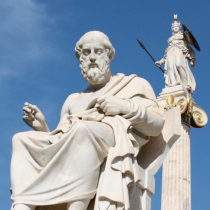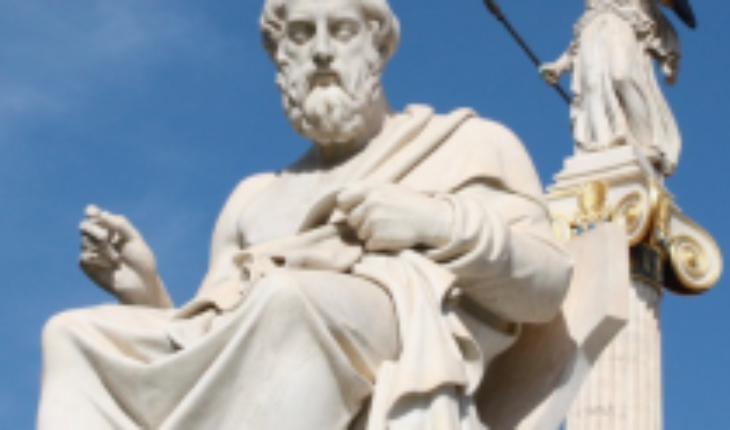
Two millennia ago one of the great patriarchs of Western philosophy, Plato, conceived a nation model which he called “Ideal State” and which had the philosopher-king at the head. Plato was, in fact, idealistic. Idealism is one of two great currents that have dominated the history of philosophy and universal thought (the other is materialism) and means that ultimate reality is composed of a kind of pure forms, so-called “ideas”. It is not in any way a question of ordinary thoughts, but of even more abstract things (the real objects that are quintessentially behind the things that appear in our eyes and whose transcendental power determines them). To show how reliable the approach is, I allow myself to quote Plato himself in his work Fedon: “We are deceived by the idea that we inhabit the surface of the Earth, which is as if a living being who was at the bottom of the sea imagined that it is in the knowledge rife from the water, and that the sea was the sky through which he saw the sun and the other stars, having never reached the surface because of his weakness and laziness, and having never raised his head, neither knew nor heard of someone who had seen how purer and beautiful that yours is the world above.” (The closest thing to this Ideal State I know is the formula of the “Tecnato”, a government constituted by a technoscientific elite, which was proposed by the technocratic movement of the early twentieth century. And although squeezing by the idea of a global empire of Technique in the world, the scientific pretence of knowledge and the ordination of human beings according to it was undeniable in that model of civilizing administration.)
On the contrary, the State of Chile, in its executive component, far from being an Ideal State (a state that seeks the truth underlying things, the universal values that govern all humans), looks more like that lazy fish of the Fedon (conforms to its immediate reality). Its elite sponsor, while partly recognizing and enjoying as well as the pure intellectual of the products of high culture, assisting the stars of the Theatre, adorning the walls with select replicas of the portraits of Descartes, Spinoza, Kant and Hegel (e.g.) , listening to Vivaldi’s Stravaganza or Pachelbel’s Canon in D major, and quoting one’s intellectual side by desirability or vanity, is truly prey to economic rationality, square ignorance of econometrics. What takes precedence at the end of the day is not humanism. It does not permeate the spirit of that purported aristocracy the lyrical heroism of the Song of Mio Cid, nor the mortal pleasure of the Faust of Goethe who seeks contemplation of the greatest work of which a man is capable, much less, in his presumed religiosity , the rational persecution of the Supreme Good as read in the beautiful and epic verses of The Lost Paradise of English that backs Shakespeare, I mean John Milton, the rationalist who fought for the abolition of the monarchy and which contributed to the establishment of Oliver Cromwell’s Commonwealth of England, of which he was minister, following the regicide of the monarch Charles I of the Royal House of Stuart.
What prevails at the end is the economic-financial return, the personalistic utility. The Executive Power of the State of Chile, the Chilean government, is a victim of its ideological biases. His god is not, to put him in a metaphor, the God of the Christian universe, but the merchants, the system to which he pays tribute under the maxim Machinist that the end justifies the means. He has incurred in what corporate literature, based on the developments of cognitive psychology, has come to call “workshop bias” (in the simplest terms of neuroscience: the activity of threat circuits prevails over those of reward, and the fear of novelty is so strong that it inhibits the possibility of new learning and ankylises the mind with the world’s worldview, which becomes impassable at the end). In other words, in the vertigo of sustaining the operation (your plan, roadmap or ideario), the organization or company embodied by the Chilean government begins to stumble, as the hamster pressed inside the spinning wheel, with its own steps, with the danger of Collapse. Far is to reflect on his actions and that is why he incurs again and again in the same stratagems and fails.
That is why it is not uncommon that even as soon as March began, enacting the Gabriela Act, the President fencing that violence is the fault of both violent men (violent?) and women who let themselves be violent (masochistic women, then?). Nor is it surprising that a Minister Rubilar, with a little more kilos in her body (hopefully not caused by that anxiety of keeping the operation as it may occur), seems to frighten potential protesters with the assurance that the President will make use of the necessary resources (even if that entails a new state of emergency) to ensure the order and security of the state (police?).
For all these things I conclude that La Moneda lacks philosophy, if not at least a psychologist (or a neuroscientist who remedys his operational neurosis). Because and already ending the rhetorical figure that I have validated, we all know that more dangerous than a monkey with a knife is, in fact, a madman armed.
The content poured into this opinion column is the sole responsibility of its author, and does not necessarily reflect the editorial line or position of El Mostrador.





